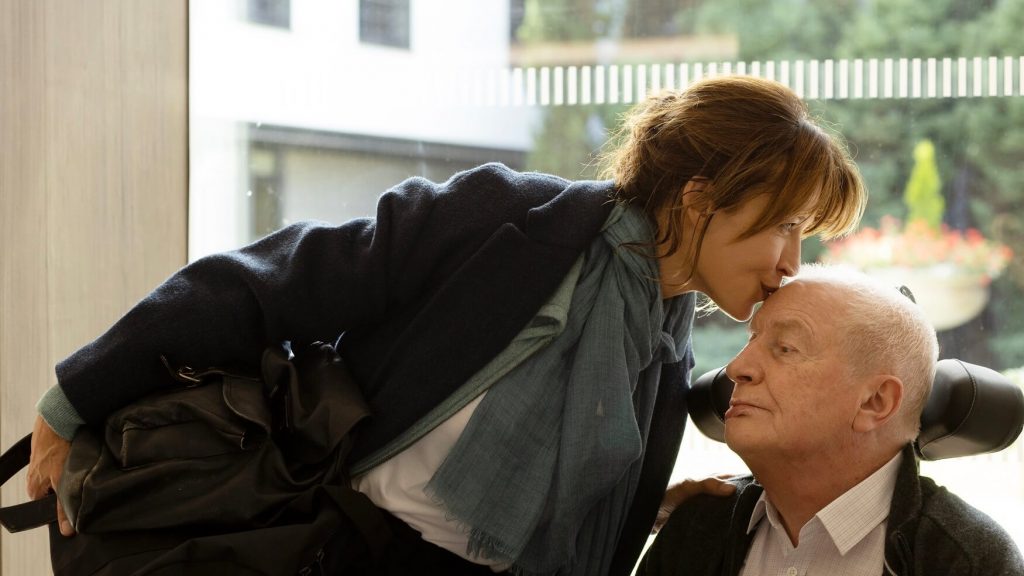Sophie Marceau (the object of every 90s Bond fan’s desire) is a woman whose father asks too much in Everything Went Fine, the new film from acclaimed French director François Ozon. Based on Emmanuèle Bernheim’s autobiographical novel Everything Went Well, the story follows two sisters dealing with the aftermath of their father’s major stroke and the often comedic hoops through which they must jump to smuggle him out of France and into a nation renowned for its history with voluntary assisted dying. What could’ve been a morose outing is instead a beautifully pragmatic and realistic memoir from one of Ozon’s collaborators, and a respectful dedication to her memory.
Emmanuèle (Marceau) is tapping away on her laptop at home when she gets the call that her father has had a stroke. She rushes out, realises she can’t see the stairs in her apartment building, then heads back inside to put in her contact lenses – a small moment serving as a sobering reminder that as our parents get older, so too do we. Her choice to opt for contacts in a situation that calls for speed is odd (especially considering the pair of glasses she leaves on her desk), but it hints at the insecurities Emmanuèle feels around her father, preparing us for the complicated relationship we will soon see.
Arriving at the hospital entrance, she meets her sister, Pascale (Géraldine Pailhas) and it’s clear the two have a strong bond. Elder holds younger as they walk in unison to their father’s ward, only to find him in rather a bad way. André (André Dussollier) has lost sensation in his right arm and his eye and mouth droop noticeably. A regurtitative splutter startles Emmanuèle more than it does Pascale and André asks them to “go away”, holding his free hand up as if to shield himself from their looks. Later, when André has been discharged from hospital and moved to a bougie care facility, he grips his daughter’s wrist as she brings white roses for his room and requests that she help him “end it”.
The moment is so matter-of-fact that it’s one of the film’s greatest strengths. Non-diegetic classical music seamlessly fades into the scene, played through André’s radio on a casual afternoon. He is an art collector (as was his real life inspiration, André Bernheim) and appreciator of the finer things in life and as such, feels very strongly that it’s time to go. But Emmanuèle is neither prepared for the prospect of her father’s euthanasia nor the request to action it, and so begins her journey of learning how to grieve someone who is still alive.
Everything Went Fine favours small, poignant moments over melodrama – a half-eaten sandwich memento stored in the freezer, the rescheduling of D-Day over a grandson’s music recital – all of which give the film a sense of realism quite unlike others with similar themes. The humour weaved throughout is also a welcome distraction from the difficult subject matter, oftentimes causing the 65 years+ cohort in our audience (the majority) to howl with laughter at the cruel joke that is age-based illness and marriage that goes on too long. But it’s the central relationship and Emmanuèle’s attempts to process its end that elevate this story.

Sophie Marceau and André Dussollier
Flashbacks to Emmanuèle’s childhood and discussion of André’s extramarital affairs reveal that he was an absent father at best and a bit of a bully at worst. Criticising her weight and appearance in her most vulnerable years, the most praise André gives his daughter is claiming that she’s his “favourite son”. Pascale is Pascale but to André, Emmanuèle is “Manu” and it’s an indescribable connection the two share, despite his bouts of nastiness. While Pascale maintains that their father’s cruelty to her sister in their youth is still better than the lack of attention she received, the two ponder the possibility that this request (submitted only to one of them) is their father’s final ruse in playing the two against each other.
Emmanuèle’s past issues with her father come flooding back as she’s forced to fasttrack a resolution to his request, while dreams of shooting him in the head (perhaps recurring since her youth) enter her sleep once more . Grappling with the fact that she may have manifested her childhood desire now that her father has (in a sense) asked her to do as such, Emmanuèle finds solace from the guilt in Xavier Gens’ Frontier(s) and the particular comfort that only gore can provide.
As his daughters flit back and forth between relief over thinking André may have changed his mind and pressure to book in a date with La Dame Suisse from the Right To Die association, acceptance starts to set in and other issues come to the forefront. How will they dodge a prison sentence, should they get caught? How will they deal with André’s cousin Simone, a holocaust survivor from New York who, for obvious reasons, is outraged that he would choose to die? Why is Shithead hanging outside the hospital all the time and what does he want? The grieving process is different for everyone but their parents’ woes (Charlotte Rampling plays their mother, Claude, who has Parkinson’s and a general indifference towards their father) have only strengthened the sisters’ relationship and ability to cope.
According to interviews, very little of this story is fiction. The real André Bernheim was a difficult man and the real Emmanuèle Bernheim had to deal with him. The task of reflecting this on film is tricky, but is pulled off with great success by Marceau and Dussollier, who are so believable as a long-suffering daughter and selfish old prick respectively that it’ll be impossible for some not to see facets of their own relatives within. Ozon is also refreshingly blasé about the secrets within the family, choosing to let each of André’s eccentricities and character flaws go by without judgement and not allowing them to distract from what’s actually important. These feel like real people, interacting in ways that are likely recognisable to you or someone you know.
I made the potentially risky decision to attend this screening with a dear friend whose familiarity with the themes of the film are all too personal. As the similarities between her circumstances and those depicted on screen became more apparent, I wondered if I’d made a huge mistake in exposing her to nonconsensual catharsis on the Saturday morning before her birthday. But Everything Went Fine is as much a celebration of the complexities of familial relationships as it is a difficult story about letting go. It’s very likely that you’ll cry (and Luna really should read the room in turning the lights back on too quickly after a film like this), but you’ll also be held tenderly and told that it’s going to be okay. 8/10.
Everything Went Fine is in cinemas Thursday 19th May.


